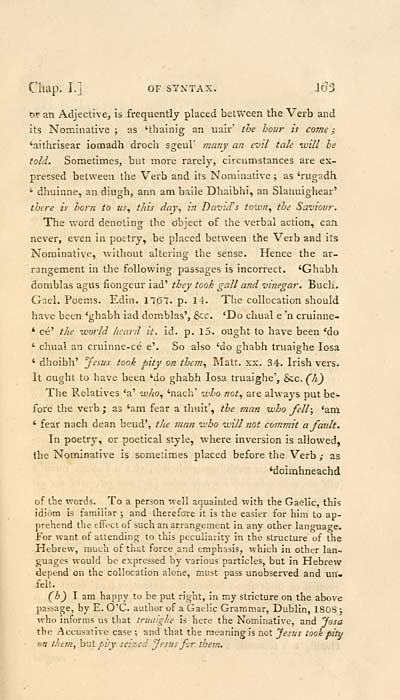Download files
Complete book:
Individual page:
Thumbnail gallery: Grid view | List view

Chap. I.] OF SYN'TAX. Jo3
or an Adjective, is frequently placed between the Verb and
its Nominative ; as Hhainig an uair' the hour is come ;
*aithrisear iomadh drocli sgeul' 7?mny an e-Jil tale will be
told. Sometimes, but more rarely, circumstances are ex-
prei:sed between the Verb and its Nominative ; as 'rugadh
' dhuinne, an diugh, ami am baile Dhaibhi, an Slanuighear'
there is^ horn to us., this day., in David's town., the Samour.
The word denoting the object of the verbal action, can
never, even in poetry, be placed between the Verb and its
Nominative, without altering the sense. Hence the ar-
rangement in the following passages is incorrect. *Ghabh
domblas agus fiongeur iad' they took gall and mtiegar. Bucli.
Gnel. Poems. Edin. 1767. p. 14. The collocation should
have been 'ghabh iad dom.blas', &:c. 'Do chual e 'n cruinne-
* ce' the %vorld heard it. id. p. 15. ought to have been *do
' chual an cruinue-ce e'. So also 'do ghabh truaighe losa
' dhoibh' 'Jesus took pity on them^ Matt. xx. 34. Irish vers.
It ought to have been 'do ghabh losa truaighe', See. (^Ji^
The Relatives 'a' who., 'nach' who not., are always put be-
fore the verb ; as 'am fear a thuit', the man who fell; <am
' fear nach dean beud', the ?nan who will not commit a fault.
In poetry, or poetical style, where inversion is allowed,
the Nominative is sometimes placed before the Verb ; as
'doimhneachd
of the words. To a person well aquainted with the Gaelic, this
idiom is familiar j and therefore it is the easier for him to ap-
prehend the efF<-ct of such an arrangement in any other languao-e.
For want of attending to this peculiarity in the structure of the
Hebrew, much of that force and emphasis, which in other lan-
guages would be expressed by various particles, but in Hebrew
depend on the collocation alone, must pass unobserved and un-
felt.
(h) I am happy to be put right, in my stricture on the above
passage, by E. O'C. author of a Gaelic Grammar, Dublin, 1808 j
who informs us that truaighe is here the Nominative, and Josa
the Accusative case ; and that the meaning is not Jesus took pity
en them, but pity seized Jesus fr them.
or an Adjective, is frequently placed between the Verb and
its Nominative ; as Hhainig an uair' the hour is come ;
*aithrisear iomadh drocli sgeul' 7?mny an e-Jil tale will be
told. Sometimes, but more rarely, circumstances are ex-
prei:sed between the Verb and its Nominative ; as 'rugadh
' dhuinne, an diugh, ami am baile Dhaibhi, an Slanuighear'
there is^ horn to us., this day., in David's town., the Samour.
The word denoting the object of the verbal action, can
never, even in poetry, be placed between the Verb and its
Nominative, without altering the sense. Hence the ar-
rangement in the following passages is incorrect. *Ghabh
domblas agus fiongeur iad' they took gall and mtiegar. Bucli.
Gnel. Poems. Edin. 1767. p. 14. The collocation should
have been 'ghabh iad dom.blas', &:c. 'Do chual e 'n cruinne-
* ce' the %vorld heard it. id. p. 15. ought to have been *do
' chual an cruinue-ce e'. So also 'do ghabh truaighe losa
' dhoibh' 'Jesus took pity on them^ Matt. xx. 34. Irish vers.
It ought to have been 'do ghabh losa truaighe', See. (^Ji^
The Relatives 'a' who., 'nach' who not., are always put be-
fore the verb ; as 'am fear a thuit', the man who fell; <am
' fear nach dean beud', the ?nan who will not commit a fault.
In poetry, or poetical style, where inversion is allowed,
the Nominative is sometimes placed before the Verb ; as
'doimhneachd
of the words. To a person well aquainted with the Gaelic, this
idiom is familiar j and therefore it is the easier for him to ap-
prehend the efF<-ct of such an arrangement in any other languao-e.
For want of attending to this peculiarity in the structure of the
Hebrew, much of that force and emphasis, which in other lan-
guages would be expressed by various particles, but in Hebrew
depend on the collocation alone, must pass unobserved and un-
felt.
(h) I am happy to be put right, in my stricture on the above
passage, by E. O'C. author of a Gaelic Grammar, Dublin, 1808 j
who informs us that truaighe is here the Nominative, and Josa
the Accusative case ; and that the meaning is not Jesus took pity
en them, but pity seized Jesus fr them.
Set display mode to: Large image | Transcription
Images and transcriptions on this page, including medium image downloads, may be used under the Creative Commons Attribution 4.0 International Licence unless otherwise stated. ![]()
| Early Gaelic Book Collections > Blair Collection > Elements of Gaelic grammar > (195) |
|---|
| Permanent URL | https://digital.nls.uk/79042315 |
|---|
| Description | A selection of books from a collection of more than 500 titles, mostly on religious and literary topics. Also includes some material dealing with other Celtic languages and societies. Collection created towards the end of the 19th century by Lady Evelyn Stewart Murray. |
|---|
| Description | Selected items from five 'Special and Named Printed Collections'. Includes books in Gaelic and other Celtic languages, works about the Gaels, their languages, literature, culture and history. |
|---|

